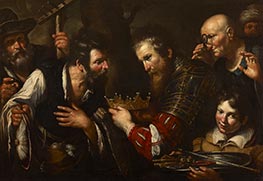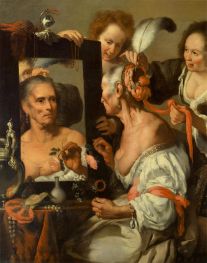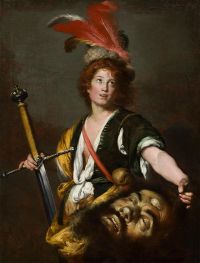Bernardo Strozzi Painting Reproductions 1 of 1
1581-c.1644
Italian Baroque Painter
Bernardo Strozzi, who was also known as il Cappuccino or il Prete Genovese (the Genoa priest), is considered to be one of the most important and prolific exponents of Italian Baroque painting. He had a signature style that was characterized by the use of intense colors and deep shadows.
Strozzi joined a Capuchin monastery at the age of seventeen in 1598, which was a reform branch of the Franciscan order. However, he had to leave the monastery in 1608 to take care of his mother after his father passed away. He earned a living by selling his Franciscan-inspired paintings. While working in Venice, Strozzi was exposed to new artistic influences, mainly from the work of Paolo Veronese. His early paintings, such as St. Francis in Ecstasy, show the dark emotionalism of Caravaggio. However, by the 1620s, while working in Venice, Strozzi combined an individual style that intertwined painting influences of the North with the style of Rubens and Veronese, resulting in a monumental, realistic starkness.
The Capuchin superiors condemned Strozzi's secular paintings of portraits and genre paintings, and in 1625, he was charged with illicitly practicing as an artist. When his mother died in 1630, Strozzi was pressured in court by the Capuchins to re-enter the order, but he refused to do so. As a result, he was imprisoned for a year and a half in Genoa. Upon his release, he fled to Venice to avoid confinement in a monastery.
Strozzi's painting style took on a gentler edge in Venice, which was more acceptable to the local patrons. He was likely influenced by his precursors in Venice, Jan Lys and Domenico Fetti, who had also fused the influence of Caravaggio into Venetian art.
After receiving a prestigious commission to paint Italian composer Claudio Monteverdi, Strozzi's fame grew, and he was approached by many of the leading Venetian artists to have their portraits painted. His exposure to the work of Anthony van Dyck, Peter Paul Rubens, and other Flemish artists resident or passing through Genoa contributed to a growing naturalism, warmer colors, and a rejection of the Mannerism tendencies he had previously used in his work.
Strozzi joined a Capuchin monastery at the age of seventeen in 1598, which was a reform branch of the Franciscan order. However, he had to leave the monastery in 1608 to take care of his mother after his father passed away. He earned a living by selling his Franciscan-inspired paintings. While working in Venice, Strozzi was exposed to new artistic influences, mainly from the work of Paolo Veronese. His early paintings, such as St. Francis in Ecstasy, show the dark emotionalism of Caravaggio. However, by the 1620s, while working in Venice, Strozzi combined an individual style that intertwined painting influences of the North with the style of Rubens and Veronese, resulting in a monumental, realistic starkness.
The Capuchin superiors condemned Strozzi's secular paintings of portraits and genre paintings, and in 1625, he was charged with illicitly practicing as an artist. When his mother died in 1630, Strozzi was pressured in court by the Capuchins to re-enter the order, but he refused to do so. As a result, he was imprisoned for a year and a half in Genoa. Upon his release, he fled to Venice to avoid confinement in a monastery.
Strozzi's painting style took on a gentler edge in Venice, which was more acceptable to the local patrons. He was likely influenced by his precursors in Venice, Jan Lys and Domenico Fetti, who had also fused the influence of Caravaggio into Venetian art.
After receiving a prestigious commission to paint Italian composer Claudio Monteverdi, Strozzi's fame grew, and he was approached by many of the leading Venetian artists to have their portraits painted. His exposure to the work of Anthony van Dyck, Peter Paul Rubens, and other Flemish artists resident or passing through Genoa contributed to a growing naturalism, warmer colors, and a rejection of the Mannerism tendencies he had previously used in his work.
3 Bernardo Strozzi Paintings

Alexander the Great Restoring the Throne Usurped ... c.1615/17
Oil Painting
$5870
$5870
Canvas Print
$56.90
$56.90
SKU: ZZI-19003
Bernardo Strozzi
Original Size: 123 x 175 cm
Fuji Art Museum, Tokyo, Japan
Bernardo Strozzi
Original Size: 123 x 175 cm
Fuji Art Museum, Tokyo, Japan

Vanitas (Old Coquette) c.1637
Oil Painting
$5255
$5255
Canvas Print
$65.34
$65.34
SKU: ZZI-19596
Bernardo Strozzi
Original Size: 135 x 109 cm
Pushkin Museum of Fine Arts, Moscow, Russia
Bernardo Strozzi
Original Size: 135 x 109 cm
Pushkin Museum of Fine Arts, Moscow, Russia

David with the Head of Goliath c.1636
Oil Painting
$3655
$3655
Canvas Print
$63.22
$63.22
SKU: ZZI-19711
Bernardo Strozzi
Original Size: 155.6 x 119.7 cm
Cincinnati Art Museum, Ohio, USA
Bernardo Strozzi
Original Size: 155.6 x 119.7 cm
Cincinnati Art Museum, Ohio, USA